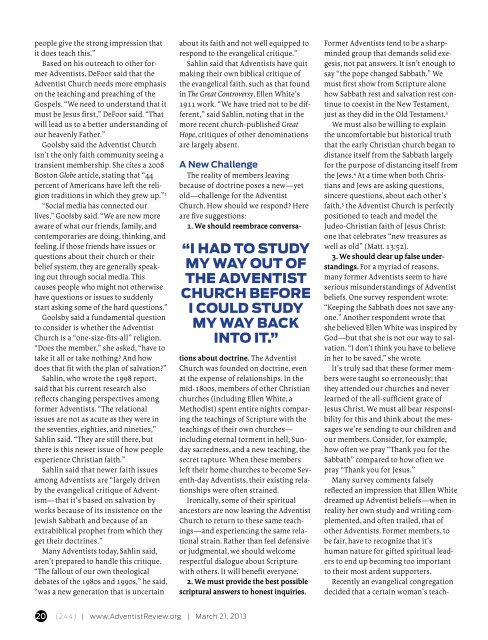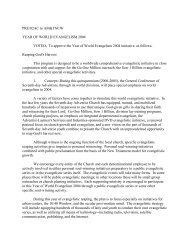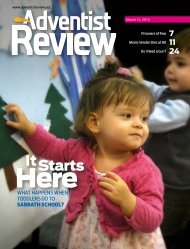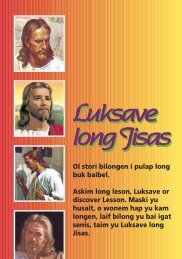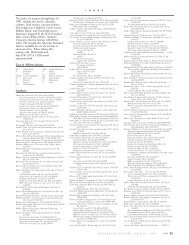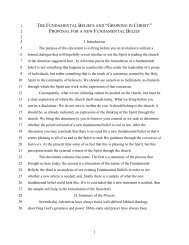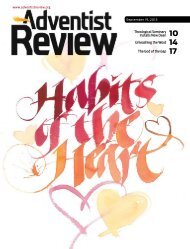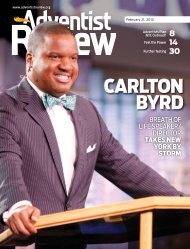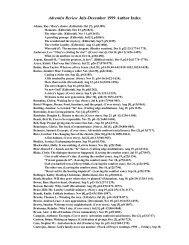Download PDF - Adventist Review
Download PDF - Adventist Review
Download PDF - Adventist Review
Create successful ePaper yourself
Turn your PDF publications into a flip-book with our unique Google optimized e-Paper software.
Former <strong>Adventist</strong>s tend to be a sharpminded<br />
group that demands solid exegesis,<br />
not pat answers. It isn’t enough to<br />
say “the pope changed Sabbath.” We<br />
must first show from Scripture alone<br />
how Sabbath rest and salvation rest continue<br />
to coexist in the New Testament,<br />
just as they did in the Old Testament. 3<br />
We must also be willing to explain<br />
the uncomfortable but historical truth<br />
that the early Christian church began to<br />
distance itself from the Sabbath largely<br />
for the purpose of distancing itself from<br />
the Jews. 4 At a time when both Christians<br />
and Jews are asking questions,<br />
sincere questions, about each other’s<br />
faith, 5 the <strong>Adventist</strong> Church is perfectly<br />
positioned to teach and model the<br />
Judeo-Christian faith of Jesus Christ:<br />
one that celebrates “new treasures as<br />
well as old” (Matt. 13:52).<br />
3. We should clear up false understandings.<br />
For a myriad of reasons,<br />
many former <strong>Adventist</strong>s seem to have<br />
serious misunderstandings of <strong>Adventist</strong><br />
beliefs. One survey respondent wrote:<br />
“Keeping the Sabbath does not save anyone.”<br />
Another respondent wrote that<br />
she believed Ellen White was inspired by<br />
God—but that she is not our way to salvation.<br />
“I don’t think you have to believe<br />
in her to be saved,” she wrote.<br />
It’s truly sad that these former members<br />
were taught so erroneously; that<br />
they attended our churches and never<br />
learned of the all-sufficient grace of<br />
Jesus Christ. We must all bear responsibility<br />
for this and think about the messages<br />
we’re sending to our children and<br />
our members. Consider, for example,<br />
how often we pray “Thank you for the<br />
Sabbath” compared to how often we<br />
pray “Thank you for Jesus.”<br />
Many survey comments falsely<br />
reflected an impression that Ellen White<br />
dreamed up <strong>Adventist</strong> beliefs—when in<br />
reality her own study and writing complemented,<br />
and often trailed, that of<br />
other <strong>Adventist</strong>s. Former members, to<br />
be fair, have to recognize that it’s<br />
human nature for gifted spiritual leaders<br />
to end up becoming too important<br />
to their most ardent supporters.<br />
Recently an evangelical congregation<br />
decided that a certain woman’s teachpeople<br />
give the strong impression that<br />
it does teach this.”<br />
Based on his outreach to other former<br />
<strong>Adventist</strong>s, DeFoor said that the<br />
<strong>Adventist</strong> Church needs more emphasis<br />
on the teaching and preaching of the<br />
Gospels. “We need to understand that it<br />
must be Jesus first,” DeFoor said. “That<br />
will lead us to a better understanding of<br />
our heavenly Father.”<br />
Goolsby said the <strong>Adventist</strong> Church<br />
isn’t the only faith community seeing a<br />
transient membership. She cites a 2008<br />
Boston Globe article, stating that “44<br />
percent of Americans have left the religion<br />
traditions in which they grew up.” 2<br />
“Social media has connected our<br />
lives,” Goolsby said. “We are now more<br />
aware of what our friends, family, and<br />
contemporaries are doing, thinking, and<br />
feeling. If those friends have issues or<br />
questions about their church or their<br />
belief system, they are generally speaking<br />
out through social media. This<br />
causes people who might not otherwise<br />
have questions or issues to suddenly<br />
start asking some of the hard questions.”<br />
Goolsby said a fundamental question<br />
to consider is whether the <strong>Adventist</strong><br />
Church is a “one-size-fits-all” religion.<br />
“Does the member,” she asked, “have to<br />
take it all or take nothing? And how<br />
does that fit with the plan of salvation?”<br />
Sahlin, who wrote the 1998 report,<br />
said that his current research also<br />
reflects changing perspectives among<br />
former <strong>Adventist</strong>s. “The relational<br />
issues are not as acute as they were in<br />
the seventies, eighties, and nineties,”<br />
Sahlin said. “They are still there, but<br />
there is this newer issue of how people<br />
experience Christian faith.”<br />
Sahlin said that newer faith issues<br />
among <strong>Adventist</strong>s are “largely driven<br />
by the evangelical critique of Adventism—that<br />
it’s based on salvation by<br />
works because of its insistence on the<br />
Jewish Sabbath and because of an<br />
extrabiblical prophet from which they<br />
get their doctrines.”<br />
Many <strong>Adventist</strong>s today, Sahlin said,<br />
aren’t prepared to handle this critique.<br />
“The fallout of our own theological<br />
debates of the 1980s and 1990s,” he said,<br />
“was a new generation that is uncertain<br />
about its faith and not well equipped to<br />
respond to the evangelical critique.”<br />
Sahlin said that <strong>Adventist</strong>s have quit<br />
making their own biblical critique of<br />
the evangelical faith, such as that found<br />
in The Great Controversy, Ellen White’s<br />
1911 work. “We have tried not to be different,”<br />
said Sahlin, noting that in the<br />
more recent church-published Great<br />
Hope, critiques of other denominations<br />
are largely absent.<br />
“I had to study<br />
my way out of<br />
the <strong>Adventist</strong><br />
Church before<br />
I could study<br />
my way back<br />
into it.”<br />
A New Challenge<br />
The reality of members leaving<br />
because of doctrine poses a new—yet<br />
old—challenge for the <strong>Adventist</strong><br />
Church. How should we respond? Here<br />
are five suggestions:<br />
1. We should reembrace conversations<br />
about doctrine. The <strong>Adventist</strong><br />
Church was founded on doctrine, even<br />
at the expense of relationships. In the<br />
mid-1800s, members of other Christian<br />
churches (including Ellen White, a<br />
Methodist) spent entire nights comparing<br />
the teachings of Scripture with the<br />
teachings of their own churches—<br />
including eternal torment in hell, Sunday<br />
sacredness, and a new teaching, the<br />
secret rapture. When these members<br />
left their home churches to become Seventh-day<br />
<strong>Adventist</strong>s, their existing relationships<br />
were often strained.<br />
Ironically, some of their spiritual<br />
ancestors are now leaving the <strong>Adventist</strong><br />
Church to return to these same teachings—and<br />
experiencing the same relational<br />
strain. Rather than feel defensive<br />
or judgmental, we should welcome<br />
respectful dialogue about Scripture<br />
with others. It will benefit everyone.<br />
2. We must provide the best possible<br />
scriptural answers to honest inquiries.<br />
20 (244) | www.<strong>Adventist</strong><strong>Review</strong>.org | March 21, 2013


